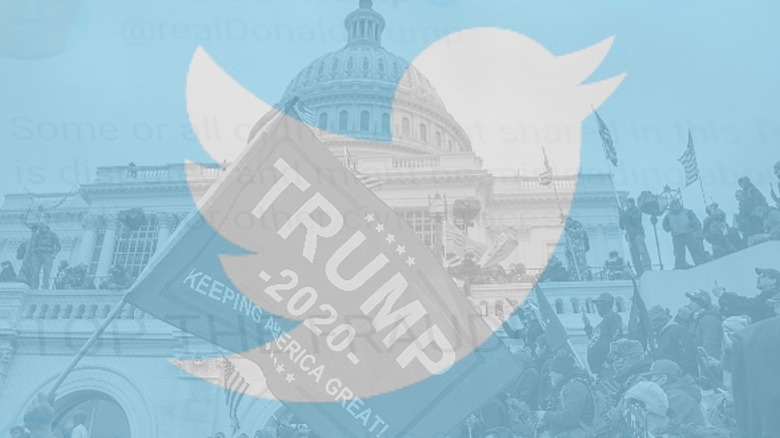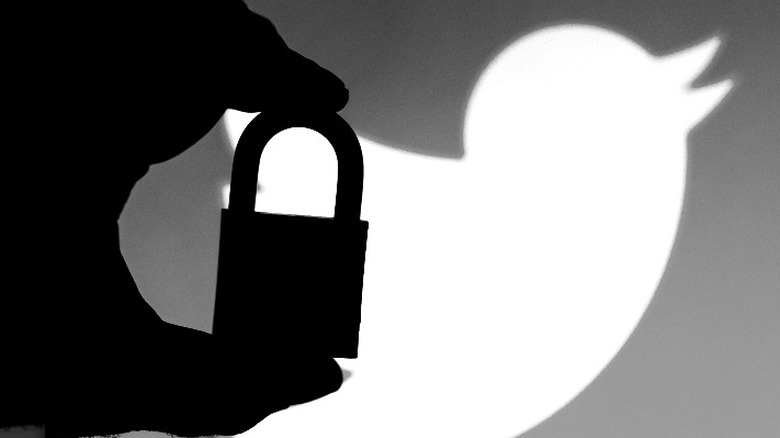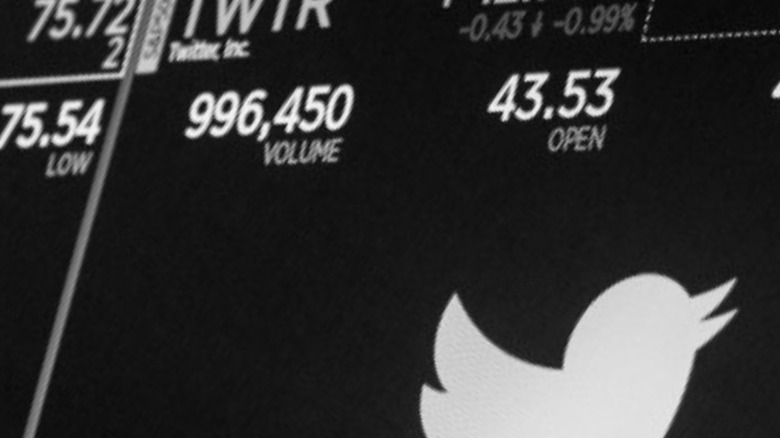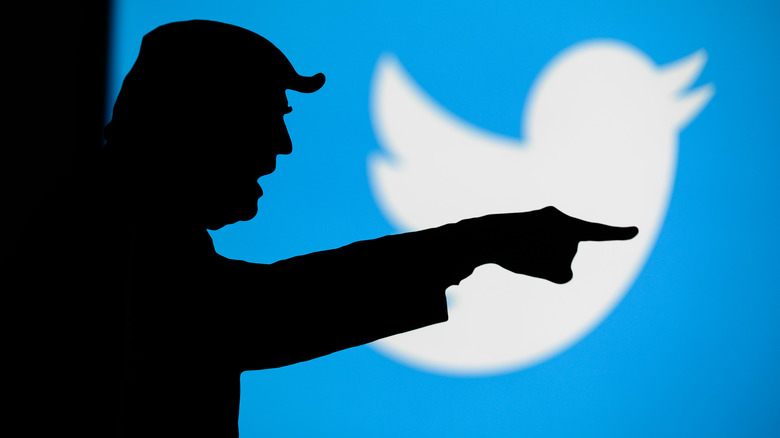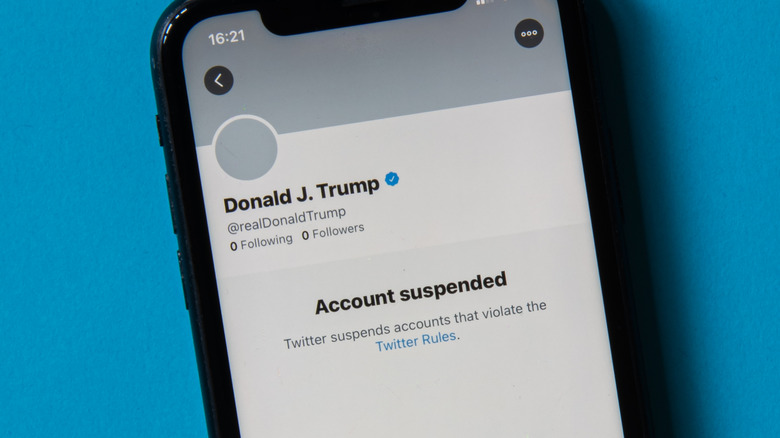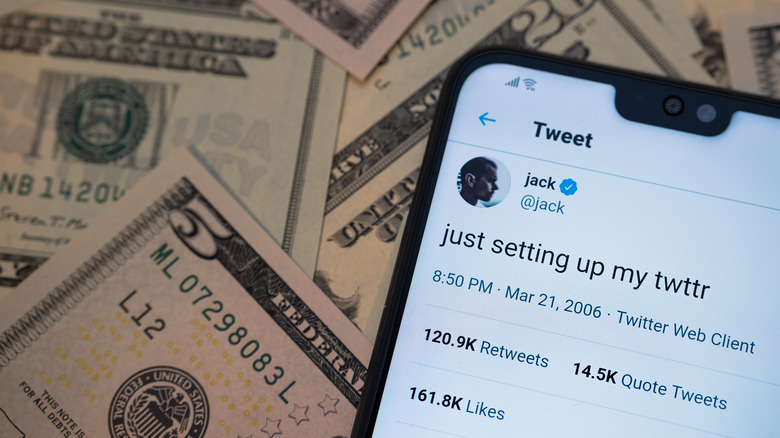The Biggest Scandals To Hit Twitter
It's a known fact that Twitter is the epicenter of online harassment, celebrity cancellations, and is second perhaps only to Facebook as a source of "alternative facts." In search of racist tirades and jokes about genocide? Twitter is definitely the place to find them. Ready to find a community planning forcible overthrow of the United States government who will live-tweet their invasion of a federal building? You'll find that on Twitter dot com.
Jack Dorsey's $12-billion-dollar company (via GoBankingRates) reflects the character of its user base. When your product is used for everything from election misinformation to plotting insurrection to tracking political dissidents to stealing money in Bitcoin scams, you can't emerge from that cesspool unscathed. Forever cursed by its users, the culture of Twitter is one the company allows to perpetuate, if not one it cultivates as a critical component of its business model. Or at least, that's what's been argued in court. Here are just a few of the most memorable examples of the dozens of defamatory incidents to hit Jack Dorsey's little bird of vitriol and harassment, as told in 240 words or less.
July 2020: 17-year-old hacks Obama and more than 130 others
In July 2020, over 130 accounts belonging to public figures, world leaders, and celebrity influencers were overtaken by a 17-year-old ex-Minecraft scammer who infiltrated Twitter's internal system without advanced equipment of any kind. The 17-year-old scammer made a call to Twitter offices pretending to be from the IT Department, obtained employees' admin credentials by directing them to enter them to a phishing site (via New York State Department of Financial Services, or NYSDFS). Within hours, Twitter was at his mercy. Some $118,000 in Bitcoin was stolen through the hack.
The hack first came to the company's attention around 3:13 p.m. when the account for Binance, a cryptocurrency exchange, tweeted it was "giving back" millions of dollars to users who clicked the link to what was clearly a phishing website (via Wired). This isn't something any company has been known to do. The company found that dozens of accounts, including those of high-profile figures (including Barack Obama, Kim Kardashian-West, Elon Musk, and Jeff Bezos) and government-regulated cryptocurrency companies (Square, Coinbase, Binance, and more) had all been compromised. While this is any platform's nightmare, the scandal was how they dealt with it and how it could have been prevented with better security measures in place.
July 2020: Largest Breach in Twitter History
The fact that this former Minecraft-scammer (via The New York Times) was able to gain access to Twitter's internal admin system simply by social engineering reflected poorly on the company's security practices. It was also revealed that Twitter had been slow to invest in early threat-detection services, and didn't even have all its employees authorizing logins with Two-Factor Authentication (via Wired). The company faced criticism on many fronts and even from the NYSDFS for their negligence.
Additionally, their response to the security threat — absolute and total lockdown — was criticized as bizarre. They also made the decision to lockdown all verified (blue-checkmark) accounts, which were the target of the hacker, from tweeting. This meant prominent figures from world leaders to organizations like news outlets could neither communicate nor comment on the event (via The Verge and Wired). This was an unpopular move, and has highlighted the company's lack of threat-response procedures that could have been deployed to respond to the event more efficiently. The 2020 hack was considered the largest, most dangerous breach of a social media platform in recent history (perhaps aside from the Cambridge Analytica scandal on Facebook — per BBC and Gatefy), and it was accomplished by a 17-year-old kid who simply lied over the phone. Not a good look.
December 2020: Tracking political dissidents
In 2015, two Twitter employees, Ali Alzabarah and Ahmad Abouammo, were accused of working as spies for the Saudi Arabian government, using their positions at the company to pass along information about political dissidents. According to the Justice Department affidavit, Abouammo was a Media Partnerships Manager responsible for working with journalist, celebrity, and "public interest" accounts in the Middle East. He was charged with passing on information about these accounts (including phone numbers, email addresses, IP addresses, and birthdays) to Bader al-Asaker, a close ally of Saudi Arabian Crown Prince Mohammad bin Salman. Abouammo's co-defendant, Alzabarah, worked as a Site Reliability Engineer at Twitter until December 2015. He allegedly accessed over 6,000 Twitter users' private information, including users who were known critics of the Saudi Arabian government, in exchange for bribes.
The incident became public knowledge in November 2019 as FBI filings were published, but Twitter executives have kept tight-lipped on the security breach (via Justice Department and Buzzfeed News). "...You can never talk about it," a former Twitter executive said in a quote to Buzzfeed. "...Inside, it was a total nonthing [sic]. No one in the rank and file who had ever heard of it..." For unknown reasons, the Justice Department moved to drop the charges against the former Twitter employees in 2020 (via The Verge). Although this incident largely flew under the radar within the company, questions certainly linger regarding why and what took place.
January 2021: 'This claim is disputed'
The 45th president of the United States is known for his adversarial relationship with facts that could be described as a "loose acquaintanceship" at best. Perhaps the most obvious evidence of this was his use of the @realdonaldtrump Twitter account. Since his election in 2016, the former president did everything from attempt to issue executive orders via tweet (via The Washington Post, The New Yorker, and Politico) to harass members of Congress (via Politico, CNN, and NPR) to threaten nuclear war (via Vanity Fair, CNN, and The New York Times) to share blatant misinformation about a deadly pandemic (via Reuters, Vox, NBC), to simply just downright lie (via Fact Check, Snopes, and Reuters).
Nonetheless, his account was determined to be "in the public interest" as executives faced a unique new dilemma of ethics in tech (via Twitter). Despite the fact that he regularly committed policy violations that would land nearly anyone else a permanent suspension, Twitter executives were reticent to ban the commander-in-chief.
January 2021: This decision is disputed
In October 2020, the former president's tweets lying about the COVID-19 pandemic were removed as Twitter begrudgingly adhered to its own policy of removing health misinformation (via BBC). The company began marking his tweets with badges that read "This claim is disputed" (via NPR). When he began using the platform to declare victory in an election he had clearly lost, the company attempted to reign in the spread of disinformation with badges of their own (via New York University and Harvard).
But that wasn't enough to ban him — yet. It wasn't until the Capitol riots on January 6, 2020, when his supporters attempted to violently overturn the results of a democratic election, that Twitter finally decided they couldn't stoop much lower without taking heat (via Independent). On January 8, Twitter permanently suspended his account.
"In the context of horrific events this week, we made it clear on Wednesday that additional violations of the Twitter Rules would potentially result in this very course of action," Twitter wrote in "The permanent suspension of @realdonaldtrump," its public statement on the ban. "Our public interest framework exists to enable the public to hear from elected officials and world leaders directly. ... However, we made it clear going back years that these accounts are not above our rules entirely and cannot use Twitter to incite violence, among other things." In the aftermath of the worst domestic terrorist attack in American history, some have argued Twitter's enforcement was far too little, too late.
November 2021: The fall of the founder
It's difficult to argue Twitter's public image emerged from these scandals unscathed. The heat was certainly felt by Twitter founder and CEO Jack Dorsey. In the aftermath of severe pressure and criticism of the CEO for his failure to stay involved with the company's day-to-day operations, Dorsey resigned in November 2021 (via Forbes). He announced his resignation via tweet (from the @jack Twitter account), with a screenshot of the resignation letter and the caption, "not sure anyone has heard but, I resigned."
With Dorsey's resignation, Twitter has attempted to tamper the intense criticism it's faced in recent years, particularly since the 2020 hack, but the company still remains embroiled in the aftermath of its earlier choices regarding security and perhaps regarding information integrity. While scandals involving harassment, foreign election interference, hate speech, and more have also plagued the company, this is just a brief list of a few of Twitter's attested "missteps" (via The New York Times). "Scandal," it turns out, has come to be less of an event for Twitter than the reality of its day-to-day existence.
